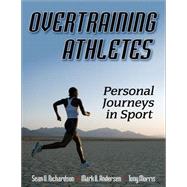Overtraining Athletes
, by Richardson, Sean- ISBN: 9780736067874 | 0736067876
- Cover: Paperback
- Copyright: 4/18/2008
Overtraining Athletes: Personal Journeys in Sportseeks to communicate the complex subject of overtraining to help athletes, coaches, parents, and sport science professionals understand the dangers of overtraining and take steps toward prevention. Using history and research, current experts'perspectives, and athletes'personal experiences, Overtraining Athletesidentifies forces that push athletes to overtrain by sharing the struggles of those athletes and the sport professionals who seek to help them.The text employs a nonlinear structure, allowing the flexibility to sample chapters from each of its four parts based on interest and level of knowledge about the topic. By presenting the phenomenon of overtraining from a variety of perspectives and with varying degrees of technicality, the book engages a wide range of readers while presenting significant research and studies in the area. Each of the four parts of the text displays a distinct method for discovering how overtraining affects athletes, coaches, parents, and professionals.Part Ibegins with a review of research examining aspects of overtraining, including prevalence, physiological and psychological manifestations, and outcomes. It concludes by discussing risk factors that increase the probability of overtraining. In part IIcoaches'and sport scientists'views on overtraining risk factors are presented. The authors interviewed 14 experts from major sport organizations in Australia to glean their perspectives on the possible variables associated with overtraining. With the perspectives of these experts, readers may identify the characteristics, behaviors, and experiences of susceptible athletes, as well as the situations, factors, sport cultures, and people that both pressure athletes to increase their training and affect athletes'needs for recovery.In part IIIthe focus turns to the experiences of the athletes. Drawing on interviews from 13 athletes with identified histories of chronic overtraining, the authors present three aggregate case studies:-A professional footballer influenced by economic forces, internalized cliched slogans, tough sport cultures, and traditional abusive practices-A triathlete obsessed with the pursuit of the Olympic gold-A young gymnast-turned-cyclist pressured by abusive coaches and an overinvolved parent These three narratives, in addition to a description of Richardson's own overtraining experience, create a rich, detailed account of athletes'struggles with overtraining. Part III concludes with observations and reflections on these four overtraining narratives to further explain how readers can learn from these athletes.In part IV, the authors introduce a comprehensive model of overtraining risks and outcomes. This model is examined in relation to other overtraining models, thus accentuating its importance as a useful, fluid tool for identifying athletes who might be at risk as well as environments and cultures that increase vulnerability to overtraining. Part IV concludes with a discussion of future directions for research and professional practice and suggestions for further study. Overtraining Athletesuncovers both the personal and interpersonal struggles encountered by athletes who overtrain. Its qualitative focus, current research, and future directions encourage readers to learn about the topic and take action in the treatment and prevention of overtraining. The authors hope the book will also encourage others to tell their stories, gather new data, and continue to unravel the question of why athletes become damaged through their participation in sport.







